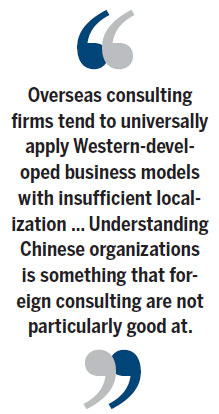The business of consulting is a two-way affair
Updated: 2014-06-06 08:10
By Terence Tsai and Yunlu Zhang (China Daily Europe)
|
|||||||||||
Chinese firms remain skeptical about what overseas advisers can do for them
Over the past 20 years the rapid growth of the Chinese economy has provided an excellent opportunity for international consulting firms to expand their businesses in China. Many have succeeded in doing so, prominent among them McKinsey, BCG, Bain, Roland Berger, and Strategy&. However, their successes have failed to dispel the skepticism of Chinese business leaders on whether such firms have anything to offer in helping them deal with their problems. Indeed, the past 10 years teach us that in many cases such firms fail to meet their Chinese clients' demands.
The overseas consulting firms tend to universally apply Western-developed business models with insufficient localization. For instance, the organizational structures and bureaucratic hierarchies of Chinese state-owned enterprises are quite different from those of Western conglomerates, and understanding Chinese organizations is something that foreign consultants are not particularly good at.
Given a more literal illustration. Party secretaries play an important role in the SOEs, but very often, foreign consulting firms underestimate their organizational influence and treat the Party secretaries merely as HR managers or political figure heads.
To make matters worse, Western business models require large databases for analytical purposes, but Chinese businesses, grappling with rapid growth fueled by the business macro-environment, are generally ill-prepared to systematically acquire the data they need.
So consulting reports developed for Chinese businesses can generally not rely on well-developed quantitative Western models of business analysis, and this can produce gaps in formulating meaningful management plans.

Moreover, international consulting firms tend not to be involved in the implementation phase of projects. Chinese clients often receive reports from overseas firms covering external and internal environmental analysis leading to strategic planning, but the reports rarely extend to strategic implementation - and it is good and efficient implantation of strategic plans that clients want most.
Avoiding implementation may be connected with a desire to avoid corruption. The inability to fully comprehend local contexts also contributes to the desire not to be involved in implementation. The complexity and the intertwining organizational structures of SOEs, for example, would be a formidable barrier for overseas consulting companies at the implementation stage.
As the basic unit of centrally planned economies, SOEs carry many social burdens that hinder their development. Thus, for international consultants, strategic implementation often suggests getting dirty hands and ignoring directions from headquarters not to become involved in intricate relationship building with government entities, negotiations with trade unions and managing various stakeholders.
International consulting firms have often suffered from a superiority complex, treating their Chinese clients as uneducated, and many even informally (or formally to their Western headquarters) complain about their clients' lack of sophistication. Having a superiority complex undermines not only communication, but the ability of foreign consultants to discover and analyze local best practice.
The answer is to find a mutually acceptable means of communication. International consultants have a lot to learn in China, and Chinese firms need to learn humility to avoid appearing as unreasonably picky. Many Chinese firms still believe that the consulting project terminates when consulting teams complete advisory project reports and walk out the front door.
On the contrary, that should be the beginning of the project. In many cases, reports with a plethora of information collected without the intervention of the clients are developed to reflect only a partial reality. That the quality of these projects is well below standard is only to be expected, as is the fact that they are soon consigned to filing cabinets.
Effective communication and equal cooperation are the basis of successful consulting projects. China is clearly emerging as an important market for multinational corporations, and consulting firms are no exception. If they can deliver real and practical added value to the Chinese clients based on China's unique institutional environment and characteristics, both will be winners.
This all means that if international consultants are to grow in China in a sustainable way, they need to pay attention to local context, including institutions, the market and culture. For Chinese businesses, to draw on the most favorable management consulting resources to help them grow, they need to participate in advisory activities and foresee and properly control risk.
Terence Tsai is a professor with the Department of Strategy and Entrepreneurship, China Europe International Business School; Yunlu Zhang is a research assistant with the same department.
(China Daily European Weekly 06/06/2014 page9)
Today's Top News
China finds way to play in 2014 World Cup
Protocol targets sex violence
Premier all business on Europe trip
Poland-China train on maiden trip
Iraq facing 'mortal threat' from militants
China, Italy boost ties
Brazil averts strike before WCup
Red meat 'linked to cancer'
Hot Topics
Lunar probe , China growth forecasts, Emission rules get tougher, China seen through 'colored lens', International board,
Editor's Picks

|

|

|

|

|

|





